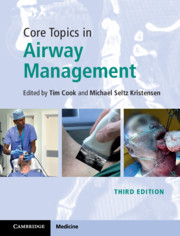Book contents
- Core Topics in Airway Management
- Core Topics in Airway Management
- Copyright page
- Contents
- Contributors
- Foreword
- Preface to the Third Edition
- Section 1 Airway Management: Background and Techniques
- Section 2 Airway Management: Clinical Settings and Subspecialties
- Section 3 Airway Management: Organisation
- Chapter 34 Departmental and Hospital Organisation
- Chapter 35 Training in Airway Management
- Chapter 36 Human Factors in Airway Management
- Chapter 37 Decontamination of Airway Equipment
- Chapter 38 Airway Management in a Respiratory Epidemic or Pandemic
- Index
- References
Chapter 34 - Departmental and Hospital Organisation
from Section 3 - Airway Management: Organisation
Published online by Cambridge University Press: 03 October 2020
- Core Topics in Airway Management
- Core Topics in Airway Management
- Copyright page
- Contents
- Contributors
- Foreword
- Preface to the Third Edition
- Section 1 Airway Management: Background and Techniques
- Section 2 Airway Management: Clinical Settings and Subspecialties
- Section 3 Airway Management: Organisation
- Chapter 34 Departmental and Hospital Organisation
- Chapter 35 Training in Airway Management
- Chapter 36 Human Factors in Airway Management
- Chapter 37 Decontamination of Airway Equipment
- Chapter 38 Airway Management in a Respiratory Epidemic or Pandemic
- Index
- References
Summary
Although an individual anaesthesia provider secures the patient’s airway, upstream organisational events will influence how airway management is actually performed in any institution. Decisions around equipment purchases, staff training, post-operative care arrangements and even departmental staffing will all influence how an anaesthetic is administered. While standardised equipment, and high quality protocols, guidelines and behaviours ensure better patient outcomes in the event of an airway emergency, this cannot be achieved without input from the institution to facilitate education and training for all airway team members. Organisations should learn from both critical incidents and examples of excellent practice, and have mechanisms to record airway events. Human factors (ergonomics) are a vital component of successful airway management and organisations should incorporate human factors education in their airway training programmes. Communication about patients known to have a difficult airway is vital and must be done effectively, especially when this involves communication between hospitals or even countries.
Keywords
- Type
- Chapter
- Information
- Core Topics in Airway Management , pp. 293 - 298Publisher: Cambridge University PressPrint publication year: 2020



